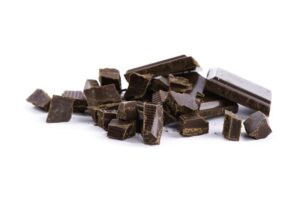
Dogs and chocolate don’t go together! If your dog ate chocolate, know what to do.
It’s good to be prepared for a pet emergency should one ever happen. Dogs are unable to eat a long list of human foods, including chocolate. If they ingest enough, it can be fatal. It is hard to stress how important it is to keep these foods away from your pet. Here is what you need to know if your dog eats chocolate.
What to Do If Your Dog Eats Chocolate
If you suspect your dog ate some chocolate, call your veterinarian or the Pet Poison Helpline (855-213-6680.) If you are in the Baltimore/Pasadena area, you can also call our urgent care number (410-355-3131) to connect to the Everhart Veterinary Hospital. Tell the vet what kind of chocolate your dog ate, how much, and how heavy the dog is. Your vet can advise you further.
One way to treat your pet is to induce vomiting via a proper dose of hydrogen peroxide. The proper dosage would be 3 teaspoons per 5 pounds of the dog’s weight, or 3 tablespoons/9 teaspoons maximum. Any more could be fatal to your dog. You will need to squirt the hydrogen peroxide into your dog’s mouth so it swallows it.
Alternatively, you can take the dog to the nearest pet emergency hospital and have the vet treat the patient. The vet might also use activated charcoal to detoxify its body.
Why Is Chocolate Toxic to Dogs?
Chocolate is dangerous to dogs because it contains caffeine and theobromine, both chemicals that dogs cannot metabolize like humans can. The results include tremors, increased heart rate, vomiting, diarrhea, increased urination, seizures, and collapse and sudden death.
White chocolate is not toxic to dogs because it doesn’t have cocoa. Keep your pet away from the following:
- Cocoa powder
- Unsweetened chocolate
- Semi-sweet chocolate
- Dark chocolate
- Milk chocolate
How to Prevent Your Dog Eating Toxic Foods
The best way to keep your dog from expanding its culinary palette is to train it to leave human food alone. Training your dog to leave food alone or to rest in a crate while you are away (also known as crate training.) Keep temptation from your pet further by storing hazardous foods out of its reach.
Trust the Care of Your Pet to the Professionals at Everhart Veterinary Medicine!
At Everhart Veterinary Medicine, our veterinary professionals strive to provide your pet with the very best of veterinary care. We believe that the best care for your pet should be provided by experienced, compassionate, and knowledgeable veterinary professionals. With three Maryland locations in Baltimore, Pasadena, and Cross Keys, we are always ready to welcome your pet as a new patient! Give us a call today at 410-355-3131, 410-793-7670, or 443-470-6790! For more information, as well as updates on veterinary news and topics, visit us on Facebook, Twitter, or LinkedIn!
